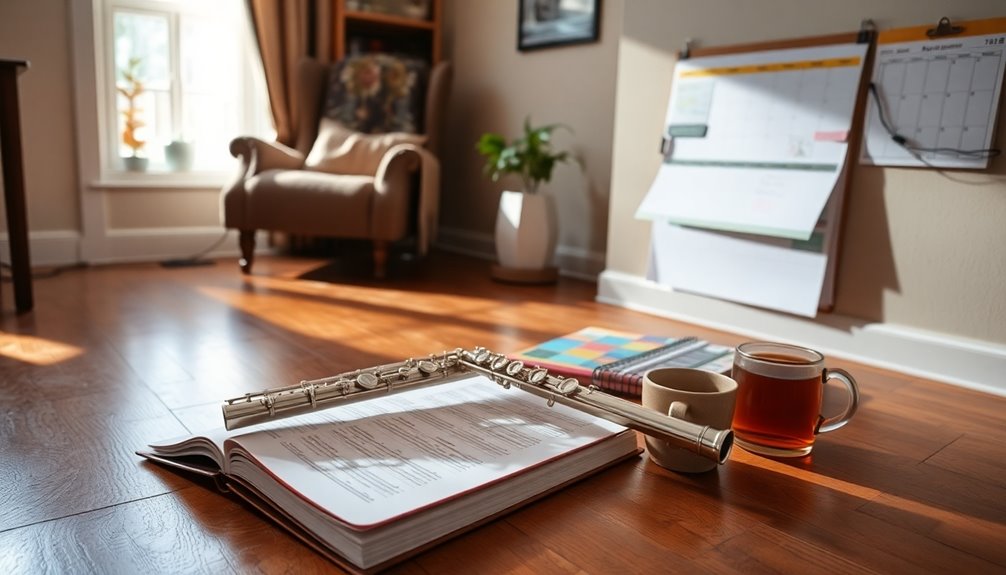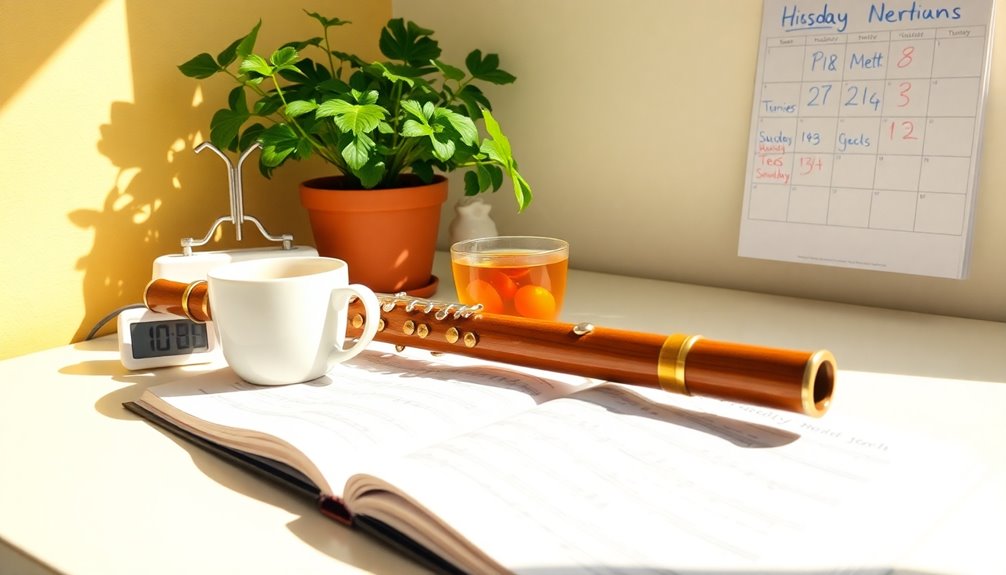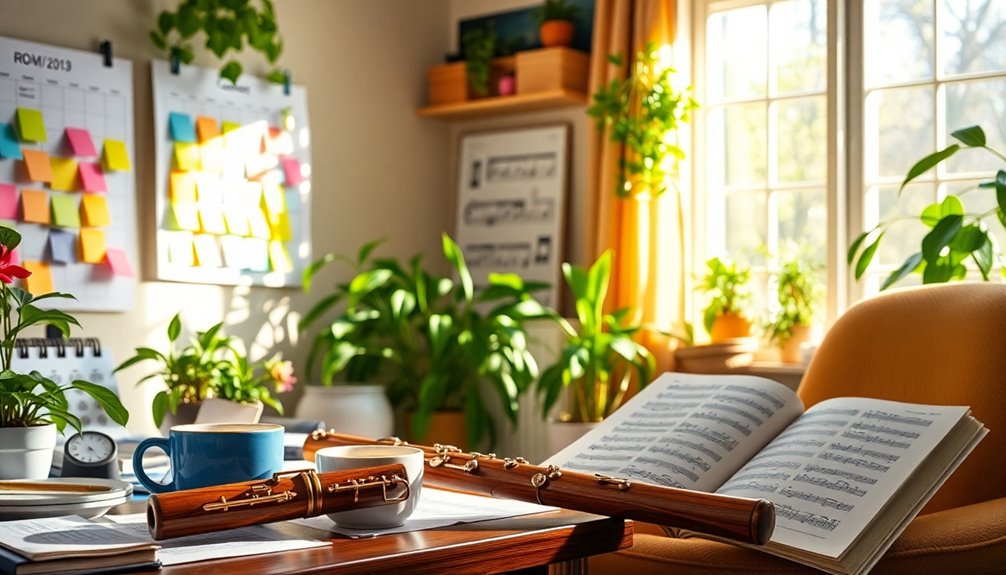Balancing flute practice with your daily life is all about strategic planning. Start by setting realistic goals that break down larger objectives into manageable tasks. Create a consistent practice schedule, making it part of your daily routine. Look for small pockets of time throughout your day to fit in practice, and consider using reminders to stay on track. Engaging with a community can boost your motivation, so connect with fellow flutists for support. Finally, keep your practice sessions varied and interesting. The next steps can make this journey even smoother and more fulfilling.
Key Takeaways
- Identify small pockets of time throughout your day for mindful flute practice, even if it's just a few minutes.
- Create a consistent practice schedule by evaluating your daily routine and committing to specific times for practice.
- Use reminders and tools like calendars or apps to ensure you stay on track with your practice sessions.
- Integrate flute practice into daily life by inviting family or friends to join, making it a social activity.
- Celebrate small victories in your progress to maintain motivation and excitement for your practice.
Setting Realistic Goals

Setting realistic goals is vital for effectively juggling flute practice with your daily life. When you approach goal setting thoughtfully, you can manage your time better and guarantee that your flute practice fits seamlessly into your routine. Start by identifying what you want to achieve. Whether it's mastering a particular piece or improving your tone, having clear objectives helps you stay focused.
Break down your main goals into smaller, achievable tasks. For instance, if you aim to play a challenging piece, set milestones, like learning a few measures each week. This way, you won't feel overwhelmed, and you'll celebrate small victories along the way. Remember, it's not just about the destination; it's about enjoying the journey.
Time management plays a significant role in this process. Allocate specific times for practice that align with your daily activities. Maybe you can spare fifteen minutes in the morning or half an hour before bed. Find a rhythm that works for you, and stick to it. Consistency is key.
Additionally, be flexible with your goals. Life happens, and you might need to adjust your plans. If you miss a practice session, don't get discouraged—just refocus and set a new goal for the week. Incorporating regular performance assessments can help you identify strengths and areas for improvement, ensuring that your practice remains effective and fulfilling.
Creating a Practice Schedule

To effectively balance flute practice with your daily commitments, creating a structured practice schedule is essential. This approach not only enhances your time management skills but also helps you prioritize effectively. A well-thought-out schedule allows you to carve out dedicated practice time while accommodating other responsibilities.
Start by evaluating your daily routine. Identify pockets of time you can allocate to practice. Here's a simple table to help you organize your practice sessions:
| Day | Practice Time |
|---|---|
| Monday | 5:00 PM – 6:00 PM |
| Wednesday | 6:30 PM – 7:30 PM |
| Saturday | 10:00 AM – 11:00 AM |
Once you fill in your practice times, commit to them as you would any other obligation. Consistency is key, so try to stick to your schedule, even if it means a shorter practice session some days. Additionally, remember that using a closed-hole flute can make practice easier for beginners.
Make use of tools like calendars or apps to remind you of your practice times. This not only fosters accountability but also reinforces the habit of prioritizing your flute practice.
Incorporating Flute Into Routines

Often, you can seamlessly weave flute practice into your daily routines without feeling overwhelmed. By integrating your musical journey into your daily rhythms, you create a harmonious balance between your responsibilities and your passion for the flute. Start by identifying moments throughout your day where you can carve out time for mindful practice.
For instance, consider playing during your morning coffee ritual or while waiting for dinner to cook. These small pockets of time can transform into moments of flute mindfulness, allowing you to connect with your instrument in a relaxed setting. You might even find that your practice becomes a rejuvenating break from your tasks, enhancing your overall well-being.
Additionally, try setting reminders or creating cues in your daily life. If you pass by your flute case, let it serve as a gentle nudge to play for a few minutes. By associating your instrument with specific routines, you're more likely to pick it up regularly. Remember that consistent practice, even in short bursts, can significantly improve your essential flute techniques.
Moreover, you can invite family members or friends to join you, creating a sense of community around your practice. Whether it's a mini concert during a family gathering or sharing tips with fellow flute enthusiasts, these interactions can enrich your experience and foster belonging.
Ultimately, by infusing your daily rhythms with flute practice, you'll discover that it doesn't need to be an isolated activity. Instead, it can seamlessly blend into your life, making music an integral part of your everyday experience.
Utilizing Short Practice Sessions

Short practice sessions can be incredibly effective for maintaining your flute skills without overwhelming your schedule. By breaking your practice into focused intervals, you can make the most of your time while still enjoying your daily activities. Even if you only have 10 to 15 minutes, you can achieve significant progress.
To get started, set clear goals for each session. Whether you're working on scales, a specific piece, or technique, knowing what you want to accomplish helps keep you focused.
During these short sessions, embrace mindful breathing. Take a moment to center yourself before you play; this not only calms your mind but also prepares your body for better performance. Incorporating diaphragmatic breathing can further enhance your tone quality and breath control during these focused intervals.
You might also find it helpful to use a timer. This way, you can commit fully to your focused intervals without worrying about how much time you have left.
When the timer goes off, take a few deep breaths and reflect on what you achieved. This practice not only boosts your skills but also fosters a sense of accomplishment.
Finding Community Support

Connecting with fellow flutists can be a game changer in your practice journey. When you find community support, you open up a world of encouragement, feedback, and camaraderie.
Joining flute groups, whether in person or online, allows you to share experiences, exchange tips, and celebrate each other's progress. These connections can make your practice feel less isolating and more fulfilling.
Consider participating in local flute groups. Many music schools and community centers host gatherings where flutists of all levels come together to play, learn, and socialize.
These meet-ups can provide inspiration and motivation, making your practice sessions more enjoyable. You'll also have the chance to collaborate with others, which can lead to new insights and techniques.
If you're short on time or prefer the flexibility of online interactions, explore online forums dedicated to flute playing. Platforms like Facebook or specialized websites host lively discussions where you can ask questions, share your challenges, and receive advice from experienced flutists.
Engaging in these forums can help you feel a sense of belonging, as you connect with individuals who share your passion. Additionally, participating in a flute ensemble can further enrich your practice by providing opportunities for skill development and musical exploration.
Don't underestimate the power of community. Whether it's a supportive group of friends or an active online forum, finding your tribe can boost your confidence and commitment to your flute practice.
Staying Motivated and Inspired

Finding a supportive community can greatly enhance your motivation as a flutist. Surrounding yourself with fellow musicians who share your love for the flute can ignite your passion and help you stay committed to your practice. Engage in local ensembles, online forums, or social media groups where you can connect with others, share your experiences, and seek advice. These interactions often lead to finding inspiration, whether it's from a new piece of music, a technique, or simply hearing someone else's journey.
To maintain your passion, set small, achievable goals that keep you focused and excited. Break down your practice sessions into manageable segments, allowing you to celebrate small victories along the way. This not only keeps your practice fresh but also adds a sense of accomplishment to your daily routine.
Incorporating variety into your practice can also help keep your motivation alive. Explore different styles of music, experiment with improvisation, or even collaborate with other musicians. This not only diversifies your skill set but also keeps your love for the flute vibrant. Additionally, consider including breathing and breath control exercises in your warm-up routines to improve your overall performance quality.
Lastly, remind yourself why you fell in love with playing in the first place. Whether it's the joy of creating beautiful sound or the thrill of performing, reconnecting with your reasons can be a powerful source of motivation.
Frequently Asked Questions
How Can I Avoid Distractions While Practicing Flute?
Avoiding distractions while practicing flute is vital for your growth. Start by creating a dedicated practice environment, free from interruptions.
Use focus techniques like setting a timer for short, concentrated sessions. Try deep breathing or visualizing your goals before you begin.
Turn off your phone and limit background noise to keep your mind clear. By establishing this routine, you'll find it easier to immerse yourself in your practice and make meaningful progress.
What Equipment Do I Need for Effective Flute Practice?
To set up for effective flute practice, you'll need a few key items. First, make certain you have a well-maintained flute; follow flute maintenance tips to keep it in top shape.
Next, create a dedicated practice space free from distractions. A music stand, metronome, and a comfortable chair can enhance your experience.
Finally, keep a journal to track your progress and goals. This setup fosters a supportive environment where you can truly thrive in your practice.
How Long Should I Practice Each Day?
When considering practice duration, aim for at least 30 minutes each day. This fits nicely into most daily schedules and helps you build skills consistently.
If you're pressed for time, break it into shorter sessions; even 10-15 minutes can be effective. Remember, consistency beats intensity.
Can I Practice Flute While Traveling?
Absolutely, you can enjoy the melodious journey of flute practice while on the road!
Traveling tips include investing in portable equipment, like a lightweight flute or a foldable stand.
Find cozy spots in parks or cafés where you can breathe life into your music amidst the hustle.
Just remember, it's all about balance—you're not just practicing; you're creating beautiful moments wherever you go.
Embrace the adventure and let your music flow!
What Are Some Warm-Up Exercises for Flute Players?
For warm-up exercises, start with long tones to develop your sound quality. Choose a comfortable note, hold it steadily, and focus on your breath control.
Then, move on to scale patterns; practice major and minor scales, ascending and descending. This not only improves your technique but also helps with finger agility.
Incorporating these exercises into your routine will enhance your playing and connect you with other flute players who share your passion.
Conclusion
By balancing your flute practice with daily life, you're not just honing your musical skills; you're also nurturing discipline and focus that spill into other areas. Research suggests that integrating small, consistent practices leads to greater mastery over time. So, keep those realistic goals in mind and embrace the support of your community. Remember, every note counts, and with a little creativity, you can make music a rewarding part of your everyday routine!






